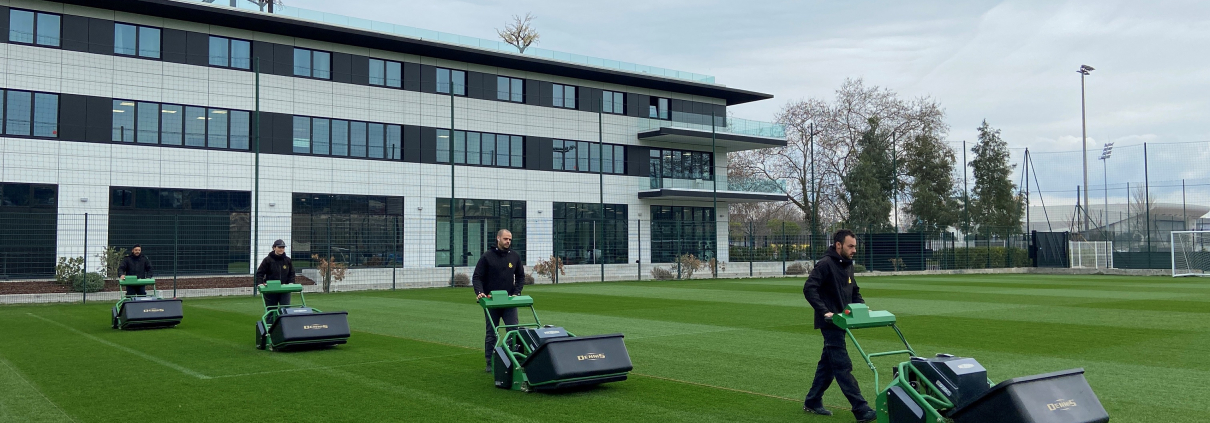Towards a new normal: The light at the end of the tunnel is getting brighter. Scott MacCallum finds out what’s next as a Coronavirus-ravaged world starts to get back on its feet.
Twelve months ago we didn’t know what was ahead of us. What we did know was that we were heading into territory none of us had ever visited previously.

Towards a new normal
Back then, I don’t think we could have envisaged the extent to which Covid 19 would impact on our lives, and we’d never even heard the word “furlough” never mind knowing what it meant.
Here on Turf Matters we have tried to be supportive, knowing that job security should be renamed job insecurity, and that many of us, or our nearest and dearest, have been touched by the virus and that there are now many, many broken families as a result of it.
But there is now a light at the end of the tunnel. Yes, variants are complicating matters but there are now vaccines and the more people who receive one of the several vaccines out there the closer we will get to some sort of new normality. Grasping at this positivity Geoff Webb and Jim Croxton, the Heads of the GMA and BIGGA respectively both took time to talk with Turf Matters, giving their thoughts on the impact Covid has had on various sports, in Geoff’s case, and golf in Jim’s.
Geoff Webb
Going back to the first lockdown it was the summer sports, cricket and bowls, which took the initial impact of the pandemic and suffered that bit more.
As it continued, the winter sports were hit too and this has been compounded by the weather over the last two months. I’m down in the south, but the cold and wet have been at record levels. It certainly was the wettest January that I can remember.
On those summer sports, the saving grace for cricket, and our sector indeed, is that it has meant that pitch preparation has come to the forefront. People are far more concerned with the quality of the playing surface than ever before, and it has meant that the role of grounds management has gone through the roof in terms of public perception. It is all gaining traction which is good news.
As we speak, we’ve just had the first round of Six Nations matches and the guys have done a fantastic job across rugby in tough conditions but if you go down the pyramid it’s tough when you don’t have the resources of the bigger facilities.
That said those working at smaller venues are doing fabulous work. For example, in football, the Women’s Super League only had one match postponed this weekend when there was freezing conditions. These are at grounds where they have fewer resources, but certainly equal passion and dedication. They are doing a brilliant job in maintaining the surfaces.
Then there is the situation at Leeds United where Elland Road’s drainage system was dated and in need of renovation, but weren’t in a position to do it because of the pandemic. The solution they came up with was to take a pitch which was being grown for the Tottenham Hotspur Stadium and transport it up to Yorkshire to see them through to the end of the season.
What a great example of the industry pulling together with good contractors, in this case Hewitt’s, and a remarkable job of engineering, logistics and of two different grounds teams communicating.
Also, I’d like to say it’s been a remarkable job done by Leeds United, who came out actively and backed their groundsman. If more boardrooms worked in the manner of Leeds United, you’d have many more successful outcomes.

Towards a new normal
We are also starting to see some parallels in terms of data collection which shows some correlation over professional level and lower tier success in the pitch investment programmes. We now have data collected over a series of visits which demonstrates what the issues really are.
We actually found in some occasions that Premier League level drainage had been installed into grass roots projects. It should never have been put in in because of the work required to maintain it. What was really needed in these cases was good basic fundamentals, to enable the pitch to be kept alive though the season. This would come in at a much lower investment level. It’s got to be appropriate use for appropriate schemes.
From the GMA’s perspective we’ve done some impactful work over the last 12 months. We had our Grounds for Sport campaign and followed that up with our White Paper on the Impact of Sport and what’s needed to be one to get it back to a high level. We also looked at gaps in terms of volunteer provision and we’ve worked to address that. We have increased our volunteer online training up to Level 3, We’d brought the Level 1 training in at the end of the first lockdown and we’ve had 1,000 people taking part in that already.
Interestingly, most of the volunteers came from football, when traditionally it would have been cricket. That said we will have cricket courses online through to July as well.
We’ve also picked up on the need to understand how artificial surfaces are maintained and are working on more new courses to help people understand what is required.
What is great is that much more priority is placed on the playing surface so I would hope that this will continue into the future.
As an industry we have always talked to each other and I’d say we’re sometimes like a disruptive family – sometimes we agree with each other and sometimes there seems to conflict.
But what we need to do as a turf care industry is recognise everyone’s strengths and not focus on the weaknesses. Working as one is important because we are all trying to do the same thing – raise the profile of the profession.
We are working to better the pay and conditions for all grounds teams anywhere, whether that be the independent school sector, universities, indeed, right across the board.
We have a professional industry which stands out uniquely on a global scale. We’ve just had the Superbowl, but that is looked at on a world scale in the same manner as the FA Cup final of the Champions League Final or Wimbledon.
The surfaces are maintained by really good people, with really good skill sets, but they have flown under the radar for too long.
We have a really resilient group of people but they are really stretched and should be recognised for their work.
It is changing and during our Grounds for Sport campaign we had one day when we hit four national newspapers, all with positive stories. We now have journalists who are interested in our sector and who do want to promote it in the same way as we all do.
With jobs not as secure as they have been, we have set up Covid pages on our website which offer practical advice and help. It means that our members can get on top of it and become so valuable to their employers that they make themselves unsackable. It has worked as we have seen limited redundancies.
But where we have seen redundancies they have been brought about because the employer has not thought things through. So, I believe, what redundancies there will be won’t be the fault or lack of skill or worth of the ground staff but the lack of foresight from the owners and where they have prioritised investment.
However, we are seeing a better understanding of grounds management and the principles attached to it.
I do hope that our shop window, Saltex, will be back in November, where we can showcase the innovation that our wonderful companies develop whether than be battery technology, seed technology. There is so much there.
All our planning for Saltex is surrounding ensuring that everyone who turns up is as safe as we can make them. That is our priority. It will be a different show to what we’ve seen before because we’ve got to work in a new environment. All fist and elbow bumps.
Jim Croxton
In general terms the last 12 months have been brilliant for golf and the upturn in people playing the game has been great – partly because it was the only thing that they were able to do. It’s probably the only thing that we can say has had a silver lining in what is a very unpleasant situation.
Also, I do believe that being in lockdown reminded everyone how much they enjoyed the great outdoors, and there is no better way of enjoying the great outdoors than being out on a golf course with friends, or even on your own.
So, there are couple of things which have gone on golf’s favour and there is no doubt that golfing numbers have been up enormously from the moment the lockdown opened up in May through to October.
The average course had an average 1,000 additional rounds a month for that six month period – that’s 30 extra people a day and if you think those extra wouldn’t have been at the weekend, it would be 40 people a day during the week. That equates to two hours of tee times, given that at certain times it would be two ball only.
So it has been a huge boost, backed up by numbers.
It has also benefitted memberships, because for periods of time clubs where open to members only, together with travel bans and restrictions which made it sensible to play your golf at one facility, so membership numbers have increased. It’s not the really the time for the nomad golfer.

Towards a new normal
However, it all puts much more pressure on the golf course itself. A single golfer is going to make 12,000 footprints during a round; he or she is going to take something between 15 and 20 divots – some of which won’t be repairable – and make 10 or 11 pitchmarks – even the good guys miss one or two. There is going to be an impact and clubs can’t go on thinking that it will be fine.
Some of the stats are extraordinary if you add the figures up. An extra 12 million footprints on a golf course each month. An extra 20,000 divots per month – that’s a lot of divoting, sanding and seeding. Pitchmarks are becoming a massive problem. Even if it is 10 per golfer per round, that’s an extra 10,000 pitchmarks per month.
Busier golf courses are great, but there is a flip side. It may also mean clubs introducing new shift patterns for their Green Staff. You might need eight greenkeepers from 6am to 10am and then not need anyone until 4pm, to ensure all the necessary maintenance work is carried out without problems of golfers and greenkeepers getting in each others’ way.
Right at the beginning there was not real role for golf unions as there was no golf being played but they were important in passing out our messages about what can be done on the golf courses. The PGA were brilliant. They recognised almost immediately that their members were in a difficult position, so they worked hard with us to put messages out.
They also used their staff who were not organising tournaments to contact every PGA member to offer support.
So, the game has come together, and delivered the message really well. However, my thought is that the future of the game is in the hands of 2,500 small businesses and we know they will deal with it in different ways.
Some clubs will be fantastic at it. They have already attracted new customers and they will look after them and keep them. I do think a lot of clubs will change their business model and their focus.
Propriatory clubs tend to do better because they look to be welcoming to visitors who bring revenue into the club. When the profit motive is strong usually customer service is strong and the proprietory sector has always been the best at that.
That said, members’ clubs are improving at this and have good people and good management in place but I do think that the furlough money has kept some golf clubs afloat.
Some clubs have said it has been catastrophic to be closed for the last couple of months, but in January weather can close many courses. The joke in January was that “if we were open we’d be shut!”
Yes, driving ranges which normally do well when the weather is bad are struggling, but most of them are solid businesses. But I do think that in 2021 and 2022 we will see some golf clubs go to the wall and I’ve already been hearing of Course Managers being made redundant.
These are financial decisions rather than performance led decisions.
I have to say that a lot of clubs have handled, what is a very difficult situation really well. They have had to reduce their work force, but it has been done in a civilised way with engagement with the staff. We can’t pretend that every job is sacrosanct, but the least we can expect is a proper process.
We have set up a new section on our website “Available for Work” where you can anonymously post your location, qualifications etc and we’ve had people find work that way. It’s a free service to members.
On the whole, I think golf has fared as well as anything as it has driven people back to golf courses and we now have an opportunity to look after them.
And it benefits us as an industry because the reason people have gone back to playing golf. It hasn’t been for the locker rooms, the bacon rolls or even the welcome in the clubhouse. It’s been to play golf on the golf course and the focus has gone back on the turf.
What golfers want is a golf course in good condition – they’ve managed without the clubhouse all year, with no catering, no bar, no changing rooms.
So hopefully people will now realise that without the golf course they don’t have a business so let’s make sure that it gets the resources that it needs.
I’ve been speaking to clubs who are now going to have maintenance weeks for the first time. Others are going to close more regularly in the winter because there is no point in destroying your golf course for a few rounds in January.
We at BIGGA didn’t quite have the staff to do what the PGA did, in contacting all their members by phone, but we have contacted many more of our members this year.
The focus between the first lockdown in March and now is that we have got back to our core which is supporting our members and we could devote time to that as we wouldn’t be running BTME. It reminded us that we are not an events business. We are a member organisation and legal assistance and mental health education is a big focus for us and that’s a good thing.

















